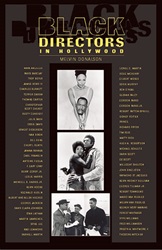By Melvin Donalson
 In his account of black film in America, Melvin Donalson has chosen to skip over the pioneering—but little seen—work of early auteur Oscar Micheaux, and begins his survey with the movies of Melvin Van Peebles and Gordon Parks, among the first African-American films to be seen by a large national audience. The great surge of black filmmaking in the 1970s—grouped under the shorthand “blaxploitation”—provides the first quarter of the book. But perhaps the most shocking thing is the gap on the contents page where the author is forced to jump from “crossover king” Michael Schultz (Cooley High and Car Wash) to the arrival of Spike Lee over a decade later. In between: nothing. Black filmmakers have never forgotten that they were essentially shut out of Hollywood after the blaxploitation boom ebbed in the late ’70s. The second time around, it would be different. Lee and those in his wake were not about to shut up and go away again, and black directors have since reached a point where their presence on big-budget studio and TV sets is more common, if still not commonplace. This isn’t to say that these filmmakers have abandoned black themes. Far from it: Since Lee pushed open the gates of Hollywood, directors have documented the African-American experience in films ranging from John Singleton’s Boyz n the Hood to the Hughes brothers’ Menace II Society to Kasi Lemmons’ Eve’s Bayou. Donalson is mindful however of the years of struggle and the psychic wounds sustained by even as forceful a personality as Lee. But the parade of talented directors—obscure and widely known, male and female, political or not—that passes under Donalson’s penetrating gaze demonstrates the forceful and positive impact these directors have had on American film in the last 25 years.
In his account of black film in America, Melvin Donalson has chosen to skip over the pioneering—but little seen—work of early auteur Oscar Micheaux, and begins his survey with the movies of Melvin Van Peebles and Gordon Parks, among the first African-American films to be seen by a large national audience. The great surge of black filmmaking in the 1970s—grouped under the shorthand “blaxploitation”—provides the first quarter of the book. But perhaps the most shocking thing is the gap on the contents page where the author is forced to jump from “crossover king” Michael Schultz (Cooley High and Car Wash) to the arrival of Spike Lee over a decade later. In between: nothing. Black filmmakers have never forgotten that they were essentially shut out of Hollywood after the blaxploitation boom ebbed in the late ’70s. The second time around, it would be different. Lee and those in his wake were not about to shut up and go away again, and black directors have since reached a point where their presence on big-budget studio and TV sets is more common, if still not commonplace. This isn’t to say that these filmmakers have abandoned black themes. Far from it: Since Lee pushed open the gates of Hollywood, directors have documented the African-American experience in films ranging from John Singleton’s Boyz n the Hood to the Hughes brothers’ Menace II Society to Kasi Lemmons’ Eve’s Bayou. Donalson is mindful however of the years of struggle and the psychic wounds sustained by even as forceful a personality as Lee. But the parade of talented directors—obscure and widely known, male and female, political or not—that passes under Donalson’s penetrating gaze demonstrates the forceful and positive impact these directors have had on American film in the last 25 years.
Review by John Patterson